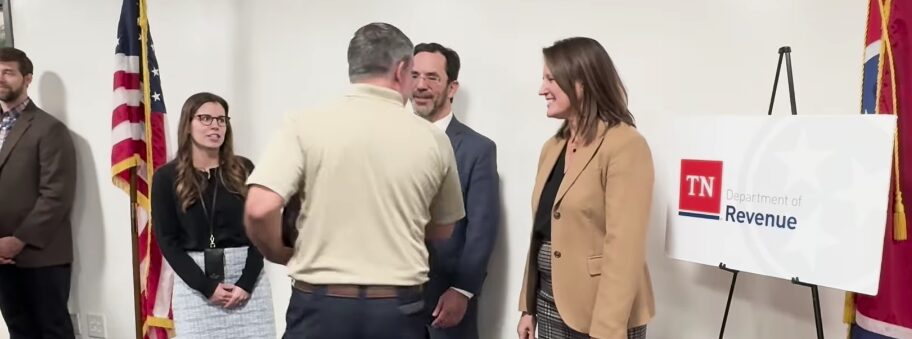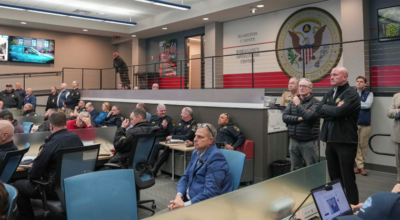
Commissioner David Gerregano, center, shakes hands at a year-end party for department employees. Counsel Courtney Swim is at left. (Photo DOR)
CHATTANOOGA, Tenn., Saturday, Jan 11, 2025 — Right now the Gnomes and I are reviewing the question of the difference between unconstitutional laws and unconstitutional acts, and whether our anti-corruption lawsuit — right now lodged in McMinn County chancery court — will be heard by the anti-corruption three-judge panel intended to spank down governmental overreach.
My lawsuit against the commissioners of safety and revenue is intending to be heard by the Tennessee three judge panel, created after the excesses of the covid-19 state of emergency. the Supreme Court has not named the three judges for the panel in the case filed November 1, 2023.
The law creating the special panel says that it can hear a case that “[c]hallenges the constitutionality of: (A) A state statute, including a statute that apportions or redistricts state legislative or congressional districts; (B) An executive order; or (C) An administrative rule or regulation” T.C.A. § 20-18-101.
QUICK TAKE ——————-
— Unconstitutional laws are void from inception
— How to tackle unconstitutional program?
What about a practice of fraud in a program that is ultra vires, meaning outside the scope of the statute? What if two commissioners named by Gov. Bill Lee to head departments are running a shakedown operation completely outside the law — outside a constitutional an acceptable statute? What if there is no written policy for what commissioner David Gerregano in revenue and Commissioner Jeff Long in safety are doing?
What if there is no “executive order” for me to target and no “administrative rule or regulation” underlying the scam?
The department of revenue says that section 210 of the Atwood amendment to the Tennessee financial responsibility law is the basis of its illegal program. In suing to overturn the program I have no intention of arguing that 210 is unconstitutional. So exactly what — on paper, in print, in writing — is unconstitutional?
Does a claim like mine of an unconstitutional activity or program allowed by the three-judge panel law?
What’s the big deal?
You might be saying that it really doesn’t matter whether my state effort to overthrow this mass fraud and injury to the poor is heard in the three-judge panel.
Could it not be heard in the chancery court of Davidson County? All lawsuits against commissioners and heads of departments have otherwise to be filed in Chancery Davidson County. The three-judge panel is created to deal just with situations like this to allow a petitioner to have judges hear the matter who are not all in Davidson County, the seat of state government. That court is susceptible to bias and prejudice, to statist presumptions, prevailing policy or insider connection. Or so thought the general assembly in ordaining the special panel.
The three-judge panel envisions a plaintiff’s local judge hearing the case in addition to one jurist from each of the state’s other two grand geographical divisions.
‘Confers no rights, imposes no duties’
We can lay aside for a minute whether my State ex re. Tulis v. Gerregano case can be fairly rejected by the Tennessee supreme court for a hearing before the three-judge panel. The U.S. supreme court in a World War II-era case expresses the contempt the courts show to unconstitutional laws.
In the case of Norton v. Shelby County, 118 U.S. 425, 6 S.Ct. 1121, 1125, 30 L. Ed. 178, 179, page 186, the Supreme Court of the United States stated that an unconstitutional statute is no law; that it is always unconstitutional; and that the judgment of the court declaring it so is simply judicial recognition that the Legislature had transcended the provisions of the Constitution. We quote from the language of the Court:
‘* * * An unconstitutional act is not a law; it confers no rights; it imposes no duties; it affords no protection; it creates no office; it is, in legal contemplation, as inoperative as though it had never been passed.’
In the case of Chicago, Indianapolis & Louisville Railway Co. v. Hackett, 228 U. S. 559, 33 S.Ct. 581, 584, 57 L.Ed. 966, at page 969, the same Court, having declared a statute unconstitutional, said:
‘* * * That act was therefore as inoperative as if it had never been passed, for an unconstituional act is not a law, and can neither confer a right or immunity nor operate to supersede any existing valid law.’
*1081 The general rule is well stated in Volume XI, American Jurisprudence, verbo ‘Constitutional Law,’ Sec. 148, page 827, as follows:
‘The general rule is that an unconstitutional statute, though having form and name of law, is in reality no law, but is wholly void, and in legal contemplation is as inoperative as if it had never been passed. Such a statute leaves the question that it purports to settle just as it would be had the statute not been enacted. Moreover, a construction of a statute which brings it in conflict with the Constitution will nullify it as effectually as if it had, in express terms, been enacted in conflict therewith.
‘Since an unconstitutional law is void, the general principles follow that it imposes no duties, confers no rights, creates no office, bestows no power or authority on anyone, affords no protection, and justifies no acts performed under it. No one is bound to obey an unconstitutional law and no courts are bound to enforce it because only the valid legislative intent becomes the law to be enforced by the courts.
**249
‘A contract which rests on an unconstitutional statute is void and creates no obligation to be impaired by subsequent legislation.’
6 Under the heading of Constitutional Law, 16 C.J.S., § 101, page 290, we find the following statement:
‘Acts Done under Unconstitutional Statutes. * * * As a general rule, all acts done under an unconstitutional law are *1082 void and of no effect, but acts that are merely incidental to an unconstitutional legislative enactment, it seems, may be valid. The legislature may direct payment of expenses incurred under an unconstitutional statute * * *.
‘Official acts. * * * Although the rule that an unconstitutional law is a nullity cannot be applied to work hardship and impose liability on a public officer who, in performance of his duty, has acted in good faith in reliance on the validity of a statute before any court has declared it invalid, in the absence of such circumstances, an unconstitutional law affords no protection to officers who act under it, and officers cannot be punished for refusing to obey such a statute. * * *
‘[Judgments.] Judgments and decrees rendered in the course of judicial proceedings under unconstitutional statutes are, according to some authority, void and should be reversed. By other authority, a judgment in a civil action under an unconstitutional statute is not void but merely voidable, and if such judgment becomes final before the statute is declared unconstitutional, it is valid and binding and cannot be disturbed, unless it is void or voidable for some other reason, at least, where the court had jurisdiction of the parties and of the subject matter and had power to render the particular judgment. Where, however, all the proceedings have not been completed before the statute purporting to give jurisdiction is held unconstitutional, and all the parties are before the court, relief from such proceedings under the statute should be granted.’
I am reporter with Eagle Radio Network — marvelously playing rock hits in Chattanooga, and online at https://www.eagleradionetwork.com/
*1083 In Corpus Juris Secundum, Constitutional Law, Vol. 16, § 101, at page 290, we find the following statement:
‘As a general rule, all acts done under an unconstitutional law are void and of no effect. * * *’
Due to the fact that situations may arise resulting from transactions and acts performed under an unconstitutional statute, whereby the parties involved are placed in positions where it would be most unequitable to follow the general rule that an unconstitutional statute was void ab initio and without any legal effect whatsoever, or where it was impossible for the court to undo what had transpired under an unconstitutional statute and to restore the parties to some reasonable position, the courts have recognized exceptions to the rule as a matter of public policy or necessity in such instances.
In the case of Chicot County Drainage District v. Baxter State Bank et al., 308 U.S. 371, 60 S.Ct. 317, 318, 84 L.Ed. 329, the United States Supreme Court said:
‘The courts below have proceeded on the theory that the Act of Congress, having been found to be unconstitutional, was not a law; that it was inoperative, conferring no rights and imposing no duties, and hence affording no basis for the challenged decree. Norton v. Shelby County, 118 U.S. 425, 442, 6 S.Ct. 1121, 1125, 30 L.Ed. 178 [186]; Chicago, I. & L. R. Co. v. Hackett, 228 U.S. 559, 566, 33 S.Ct. 581, 584, 57 L.Ed. 966 [969]. It is quite clear, however, that such broad statements as to the effect of a determination *1084 of unconstitutionality must be taken with qualifications. The actual existence of a statute, prior to such a determination, is an operative fact and may have consequences which cannot justly be ignored. The past cannot always be erased by a new judicial declaration. The effect of the subsequent ruling as to invalidity may have to be considered in various aspects,—with respect to particular relations, individual and corporate, and particular conduct, private and official. Questions of rights claimed to have become vested, of status, of prior determinations, deemed to have finality and acted upon accordingly, of public policy in the light of the nature both of the statute and of its previous application, demand examination . These questions are among the most difficult of those which have engaged the attention of courts, state and federal, and it is manifest from numerous decisions that an all-inclusive statement of a principle of absolute retroactive invalidity cannot be justified. * * *’
Flournoy v. First Nat. Bank of Shreveport, 197 La. 1067, 1080–84, 3 So. 2d 244, 248–49 (1941) (bold emphases added
David runs a personal nonprofit fighting and mercy ministry. He thanks you for checks sent directly to c/o 10520 Brickhill Lane, Soddy-Daisy, TN 37379. Also at GiveSendGo.


